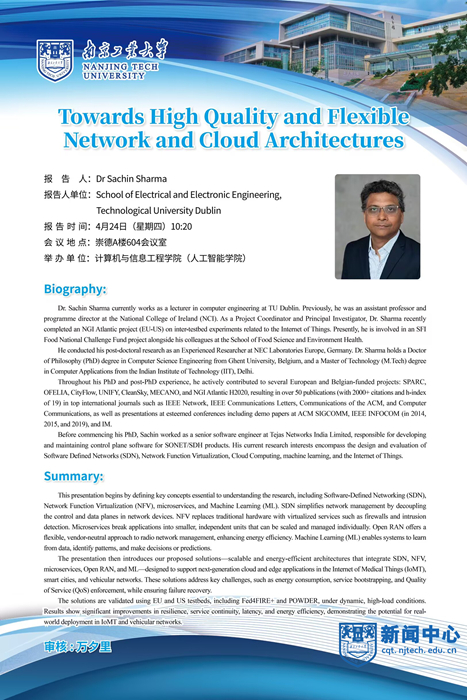学术活动 NAVIGATION
Towards High Quality and Flexible Network and Cloud Architectures
报告人:Dr Sachin Sharma
报告人单位:School of Electrical and Electronic Engineering, Technological University Dublin
报告时间:4月24日(星期四)10:20
会议地点:崇德A楼604会议室
举办单位:计算机与信息工程学院(人工智能学院)
Biography:
Dr. Sachin Sharma currently works as a lecturer in computer engineering at TU Dublin. Previously, he was an assistant professor and programme director at the National College of Ireland (NCI). As a Project Coordinator and Principal Investigator, Dr. Sharma recently completed an NGI Atlantic project (EU-US) on inter-testbed experiments related to the Internet of Things. Presently, he is involved in an SFI Food National Challenge Fund project alongside his colleagues at the School of Food Science and Environment Health.
He conducted his post-doctoral research as an Experienced Researcher at NEC Laboratories Europe, Germany. Dr. Sharma holds a Doctor of Philosophy (PhD) degree in Computer Science Engineering from Ghent University, Belgium, and a Master of Technology (M.Tech) degree in Computer Applications from the Indian Institute of Technology (IIT), Delhi.
Throughout his PhD and post-PhD experience, he actively contributed to several European and Belgian-funded projects: SPARC, OFELIA, CityFlow, UNIFY, CleanSky, MECANO, and NGI Atlantic H2020, resulting in over 50 publications (with 2000+ citations and h-index of 19) in top international journals such as IEEE Network, IEEE Communications Letters, Communications of the ACM, and Computer Communications, as well as presentations at esteemed conferences including demo papers at ACM SIGCOMM, IEEE INFOCOM (in 2014, 2015, and 2019), and IM.
Before commencing his PhD, Sachin worked as a senior software engineer at Tejas Networks India Limited, responsible for developing and maintaining control plane software for SONET/SDH products. His current research interests encompass the design and evaluation of Software Defined Networks (SDN), Network Function Virtualization, Cloud Computing, machine learning, and the Internet of Things.
Summary:
This presentation begins by defining key concepts essential to understanding the research, including Software-Defined Networking (SDN), Network Function Virtualization (NFV), microservices, and Machine Learning (ML). SDN simplifies network management by decoupling the control and data planes in network devices. NFV replaces traditional hardware with virtualized services such as firewalls and intrusion detection. Microservices break applications into smaller, independent units that can be scaled and managed individually. Open RAN offers a flexible, vendor-neutral approach to radio network management, enhancing energy efficiency. Machine Learning (ML) enables systems to learn from data, identify patterns, and make decisions or predictions.
The presentation then introduces our proposed solutions—scalable and energy-efficient architectures that integrate SDN, NFV, microservices, Open RAN, and ML—designed to support next-generation cloud and edge applications in the Internet of Medical Things (IoMT), smart cities, and vehicular networks. These solutions address key challenges, such as energy consumption, service bootstrapping, and Quality of Service (QoS) enforcement, while ensuring failure recovery.
The solutions are validated using EU and US testbeds, including Fed4FIRE+ and POWDER, under dynamic, high-load conditions. Results show significant improvements in resilience, service continuity, latency, and energy efficiency, demonstrating the potential for real-world deployment in IoMT and vehicular networks.
审核:万夕里






 公网安备32011102010195号
公网安备32011102010195号